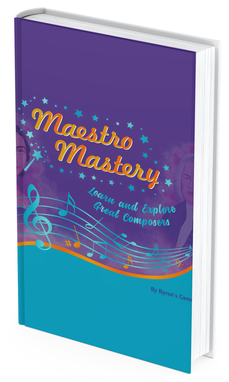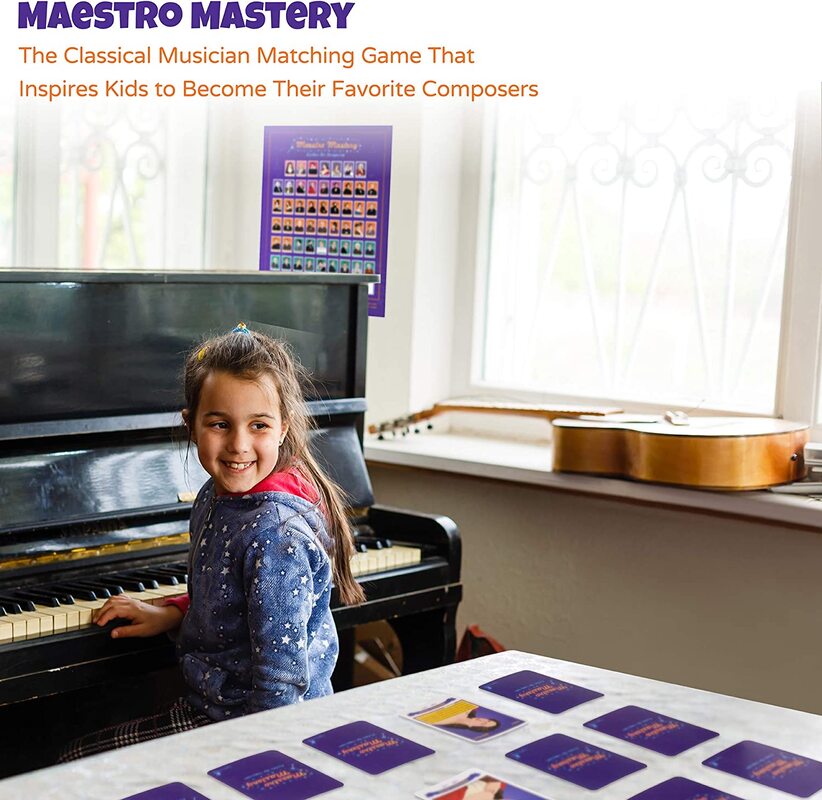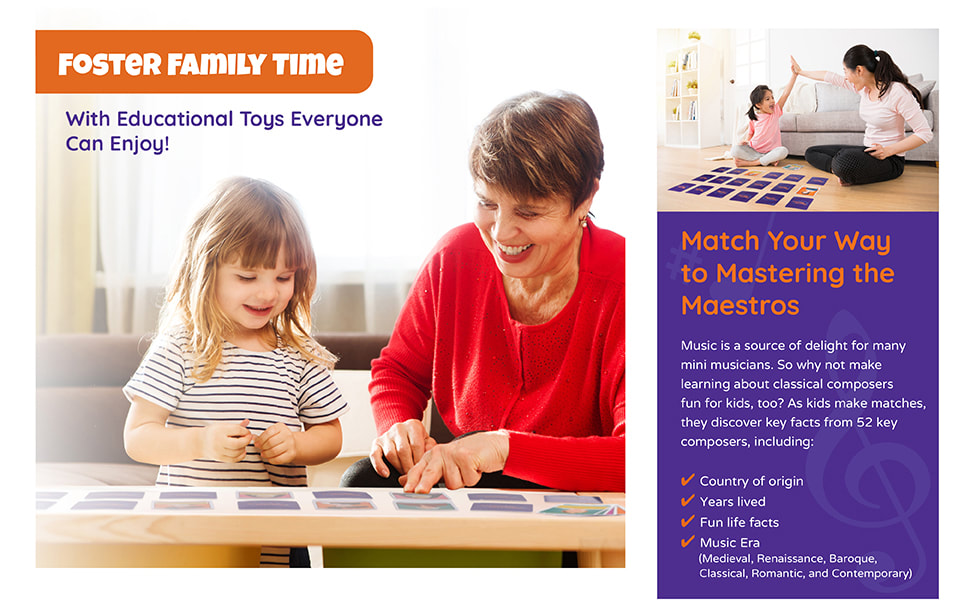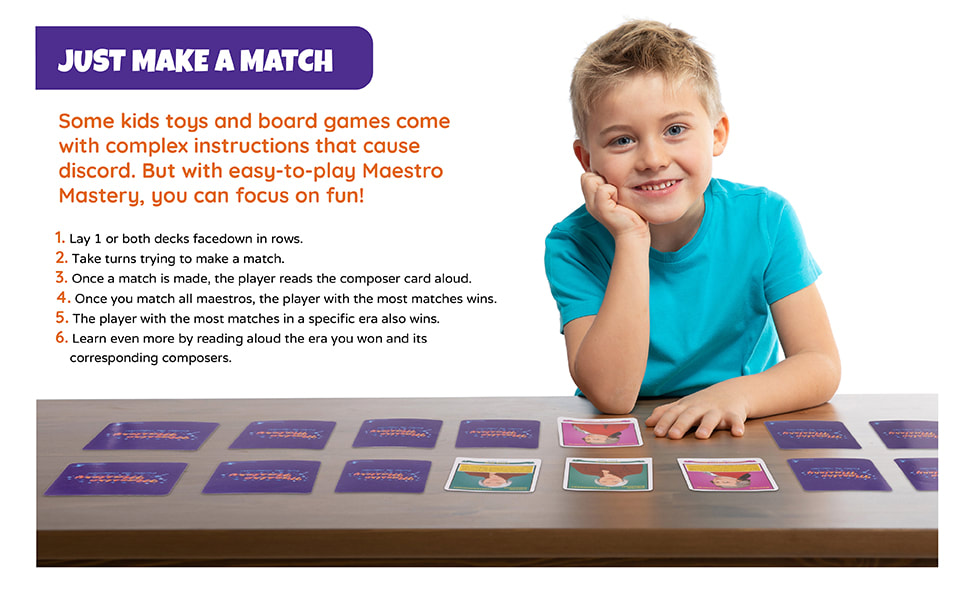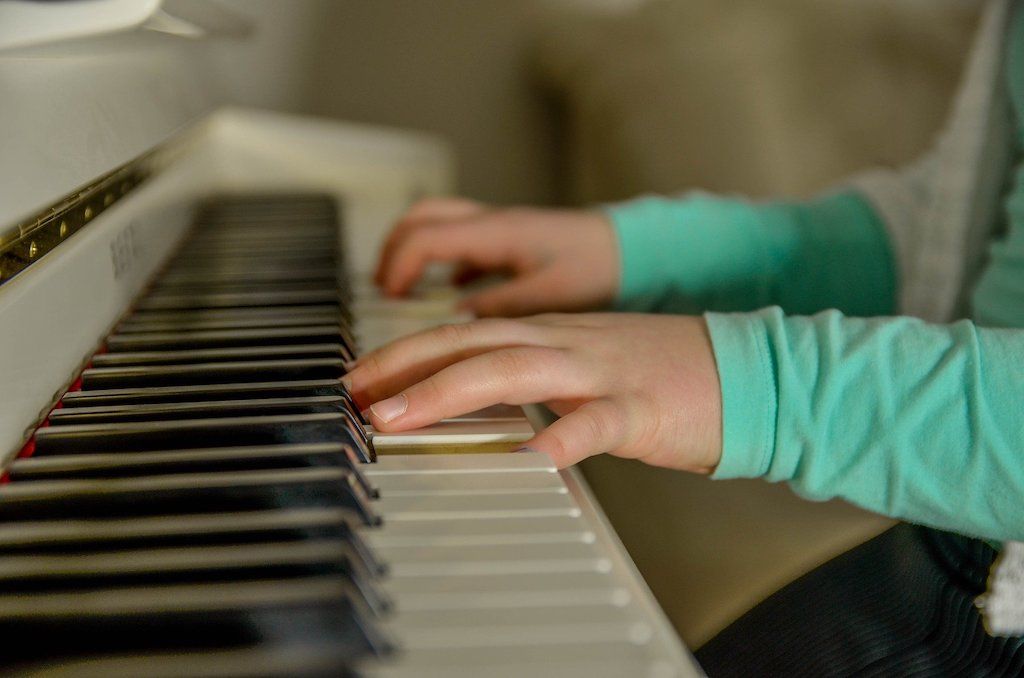|
If you're looking for a book that will get your kids excited about music, look no further than the Maestro Mastery eBook! This printable children’s book will help you nurture your child’s musical genius with photos & biographies of famous composers for kids. This digital copy of Maestro Mastery is the perfect way to inspire your child’s love of music. Your children ages 5+ will love learning about these fascinating music pioneers and their amazing achievements with this exciting and informative picture book. Plus, it even includes links to listen to samples of the famous works from these great composers! The Value of Classical Music for KidsIntroducing classical music to kids of all ages is a fantastic way for them not only to develop their musical skills, but also to learn about music history. The benefits are numerous when it comes down to how this impacts child development. From improved concentration levels to increased creativity, there are many reasons to introduce the little ones in your life to classical music. In fact, research shows that young children listening to classical music feel more relaxed and calm than before listening to it (source). Another study showed that children who undergo musical training tend to develop a better verbal memory and reading ability than children who don’t (source). With so many advantages to learning about and listening to classical music, it’s no surprise that so many music teachers, parents, and homeschoolers have loved reading the Maestro Mastery eBook with their children! Let’s explore some of the other benefits of classical music for children: 1. Improves SleepListening to classical music before bedtime is a great way to help your little one get a more restful night's sleep! In fact, researchers at the Sleep Foundation say that listening to 45 minutes of soothing classical tunes can help children of all ages, from babies to elementary school children, sleep better at night (source). 2. Better ConcentrationNot surprisingly, classical music has also been found to help elementary school children with ADHD concentrate better (source). Aside from concentration, classical tunes also appear to help with speech, language, and motor skills in young children. 3. Reduces Blood PressureA study conducted at Oxford University found that some classical music was effective in lowering the participants’ blood pressure, while the other genres studied either had no effect or actually contributed to an increase in blood pressure (source). This has led to the theory that classical music might also help in treating heart disease for kids, when used as an additional therapy alongside other treatments. 4. Suppresses StressOf course, classical music has been shown to have a calming effect on the heart, making it perfect for stress relief. In one study, this effect was even evident in children's movies and cartoons that use classical pieces as background noise (source). Even pregnant women who listen to classical music are reported to feel less stressed! 5. Increases ProductivityPlaying classical music for kids has also been found to make their reading more enjoyable. Likewise, it also tends to improve the quality of work that they do. This is because classical music creates a sense of relaxation which helps them focus on tasks for longer periods. One study even found this to be true for ADHD children (source). 6. Helps Relieve PainIt turns out that listening to classical music can even help kids with pain relief, especially with headaches! In fact, a research study showed that music therapy is extremely calming and soothing for hospitalized children and teens, and that it has a significant effect on their pain reduction (source). Fun Facts About a Few of These Brilliant Composers for KidsLet’s take a look at some of the great composers of classical music throughout the ages that are featured in the Maestro Mastery eBook. The stories of these musicians will surely inspire your child prodigy! 1. Ludwig van BeethovenBeethoven's music is so powerful and expressive that it can move people in a way no other composer has been able to match. Essentially, he translated emotions into music. Beethoven was among the child prodigies of his generation who first publicly performed at age 8. His most famous works include Symphony No. 5 in C Minor, Op 67 (1808), Symphony No. 7 in A Major, Op 92 (1813), and Symphony No. 9 in D Minor, Op 125 (1824). 2. Johann Sebastian BachRegarded as the most accomplished organist and harpsichordist of the Baroque era, J. S. Bach wasn’t widely known until after his death. However, the diversity of Bach's music is unparalleled. From large orchestral and choral settings to chamber pieces for various combinations or solo instruments, he truly wrote it all! Bach’s most famous works include Brandenburg Concerto No. 3 in G Major, Goldberg Variations, and Concerto for Two Violins in D Minor. 3. Antonio VivaldiVivaldi was a brilliant composer and a strong influence on Bach. So strong, in fact, that Bach transcribed 10 of Vivaldi’s works for keyboard instruments. Also, being a priest, Vivaldi was a prolific composer of choral and sacred music. His most famous works include Four Seasons, L’estro Armonico Op. 3, Concerto No. 10 in B Minor, and Flute Concerto La Notte. 4. Francesca CacciniShe was the first woman to compose opera and one of the most well-paid musicians in court at the peak of her career. Francesca Caccini, one of the more famous women composers, grew up with a love for music surrounded by Florence's finest artistic residents—the famed Medici family. Her most famous works include Il Primo Libro delle Musiche a una e due Voci and La Liberazione di Ruggiero dall’isola d’Alcina. 5. Wolfgang Amadeus MozartRemarkably, Wolfgang Mozart composed more than 600 pieces in his short lifetime! This prolific musician, along with his sister Maria Ana, were child prodigies. At only age 5, he began to compose and even publicly performed. His most famous works include The Magic Flute, the unfinished Requiem, and Symphony No. 41 in C Major, K. 551, nicknamed the Jupiter Symphony. 6. Florence PriceWhen the Chicago Symphony Orchestra performed a new piece by an unknown composer on June 15, 1933, it caused quite a sensation. The music critic for Chicago's Daily News declared that "this faultless work speaks its message with restraint and yet manages to convey passion." The unknown composer was Florence Price, the first black female composer to have her work performed by a major orchestra! Her most famous works include Symphony No. 1, Piano Sonata in E Minor, and Violin Concerto No. 2. 7. Pyotr Ilyich TchaikovskyMost classical music lovers are probably familiar with Tchaikovsky. His famous compositions are tuneful and picturesque. He could evoke emotion with his open-hearted melodies that make you want to dance in the street or sit down for a lovely afternoon tea. His most famous works include Swan Lake, Dance of the Sugar Plum Fairies from The Nutcracker, and 1812 Overture. Make Learning Fun with the Maestro Mastery™ eBookOf course, there are so many more incredible maestros to learn about and great masterworks of music that are worth listening to! The Maestro Mastery eBook from Byron’s Games makes it easy for you and your kiddos to discover a world of passion, genius, and sound, from the timeless tones of the Medieval Era to the modern melodies of today. Music has the power to evoke emotions, improve mental and physical health, and so much more. Plus, your child will have so much fun discovering the inspiring stories of the 52 musical legends featured in this music composers book for kids! This classical music education book also includes the time period of each composer, so your kids can also learn a little bit of history through music. Coupled with the Maestro Mastery Memory Game, this printable eBook will be your young virtuoso’s go-to guide for beginning their musical careers! ConclusionIf you have a young music lover in your life, or if you’re just looking for an exciting way to learn more about classical composers, download a copy of the most exciting book about music composers for kids—the Maestro Mastery eBook! Not only is it packed with fascinating facts, inspiring quotes, and immersive videos, but it also has beautiful illustrations that will capture the imaginations of children and adults alike. And when you’re ready for even more musical fun, don’t forget to check out our companion classical composers music game, the Maestro Mastery Memory Game from Byron’s Games! References:
0 Comments
Do you have a little Mozart or Beethoven in the making at home? If so, we’ve got the perfect printable music memory game for kids that your little maestro will simply adore! This fun matching game is not only educational, but it can also help improve your child’s memory skills, too. Plus, playing this game with siblings or friends is a total blast! So, what are you waiting for? Click here to download this print-at-home matching game and see how much your child’s long-term and short-term memory improves! What is the Maestro Mastery™ Memory Game?
It’s no secret that educational games can help a child develop key skills while having fun. That’s why the Maestro Mastery Memory Game is the perfect gift for kids ages five and above.
Maestro Mastery isn’t just any print-at-home memory card game—it actually allows children to learn about 52 of the greatest composers and their musical timelines! In fact, this game is so helpful that the Tillywig Toy Awards of 2021 crowned this memory card game with the highly coveted Brain Child Award! Here's what they have to say about the game: “This exceptionally fun memory matching game exposes children to a wealth of information about famous classical composers and their lasting contributions. As a parent, it is quite gratifying to hear youngsters excitedly discussing Mozart, Rachmaninoff, Ravel and numerous other giants of our musical heritage. Maestro Mastery's 104 matching composer cards feature 52 composers, with every card displaying the composer's portrait, country of origin, the musical era in which they were active, and dates of birth and death. One of each pair also contains details about the composer, facts so fascinating they tend to stick with players long after play is over. The color-coded cards make it easy for young kids to group matches by era, an important feature since players with the most matches from a given era are honored alongside the player with the greatest number of overall matches. A music timeline card lists the names and date ranges for each of the eras (Renaissance, Baroque, etc.) and highlights distinguishing characteristics of that era's music, while a large included wall poster allows kids to easily explore all 52 composers!” How Do You Play This Memory Game for Kids?
Luckily, Maestro Mastery is simple and easy to play. This matching card game starts with at least two players, but the whole family can join in for the musical fun!
Just place the cards facedown, then the first player chooses two cards and attempts to match the composer with the facts about them. Next, the second player does the same, and so on. When a match is made, the player reads the composer card aloud and keeps the pair. After all maestros have been matched, the player with the most matches wins. Plus, the player with the most matches in a specific era wins, too! Older kids and even adults will also enjoy playing this game because it equips everyone with a musical knowledge that might not have been learned in school. The key facts kids will learn about each composer with this game are the maestro’s country of origin, years lived, fun life facts, and the music era the composer belongs to. For just $8.99, you’ll get access to the entire digital collection of this Maestro Mastery game, which you can print an unlimited amount of times! This collection includes 2 card decks with 52 composer cards total, a musical timeline board for children to learn the different music eras from medieval to contemporary, instructions that explain how to play, and a poster of 52 of the greatest musical composers of all time, all of which are featured in the game. You can even choose to have this fun game printed at a specialty print shop to enjoy different sizes of the cards and posters, or choose to print it on thick card stock at home. Plus, this game comes with an exciting bonus! On the included instructions, you’ll find the link to an online companion tool that allows you to enjoy listening to a sample of each featured composer’s work. Listening to classical music has been shown to help improve memory, mental alertness, and even your mood. These sample music selections with the maestros’ masterful creations are sure to enhance your learning fun! Add in the Maestro Mastery™ eBook!
To further your child’s musical knowledge, you’ll love adding in the Maestro Mastery eBook! This digital and printable book allows kids to explore more about the lives and works of the 52 classical music composers featured in the Maestro Mastery game, from the timeless tones of the Medieval Era to the modern melodies of today.
Packed with fascinating facts and immersive videos, your learning ebook for kids will deepen your young virtuoso’s knowledge and appreciation of music history and its masters! Of course, it’s no secret that children are curious beings who seem to have a never-ending thirst to learn and explore. Byron’s Games makes it possible for them to do so while fostering creativity in your kiddos. With Maestro Mastery, we’re providing the tools that allow school children to learn about and even listen to great music! Both older and younger children alike will love playing the Maestro Mastery matching game and reading the accompanying Maestro Mastery ebook. This brilliant duo from Byron’s Games is sure to inspire any young musician. More About Byron’s Games
Of all the printable and online memory games out there, you can be sure that Maestro Mastery will be a major hit with your kids. In fact, all of our games at Byron’s Games have been specially designed for kids, by a kid!
Our founder Byron was only 6 years old when he found himself stuck in a hospital for a month due to an unexpected illness. During his hospital stay, his love of geography and desire to help other hospitalized children inspired him to create our first game, Continent Race®. Since then, Byron’s Games has continued to create fun and educational games, including the Maestro Mastery Memory Game! Plus, we love giving back at Bryon's Games. That's why we recently donated over 25,000 games to non-profits around the United States! Conclusion
If you're looking for a fun and educational game to help your little one learn music history, look no further than the Maestro Mastery printable music memory game! This game is perfect for younger and older children alike and it can be played over and over again for endless fun.
Plus, it's really easy to make at home. Simply download the printables from the purchase page on our website, print, and play. Click here to play today! Music fills most homes these days. Smart speakers make it convenient to play favorite songs with a verbal command. Even children can request favorite tunes with just a sentence aimed at the right device. But is simply playing favorite music—songs, whole albums, instrumentals, soundtracks from beloved movies and more—enough to gain all the benefits of music for children? Or should music be incorporated in multiple ways in the lives of kids to gain all its benefits?
|




